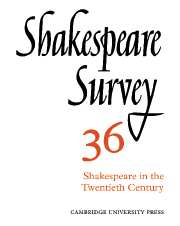Book contents
- Frontmatter
- Shakespeare and the Living Dramatist
- Blood and Wine: Tragic Ritual from Aeschylus to Soyinka
- Hamlet Andante/Hamlet Allegro: Tom Stoppard’s Two Versions
- Auden, Shakespeare, and the Defence of Poetry
- Graves on Lovers, and Shakespeare at a Lovers’ Funeral
- Tragic Balance in Hamlet
- Hamlet Across Space and Time
- Shakespeare’s Scripts and the Modern Director
- ‘He Shall Live a Man Forbid’: Ingmar Bergman’s Macbeth
- Komisarjevsky at Stratford-upon-Avon
- Troilus and Cressida and the Definition of Beauty
- The Pastoral Reckoning in Cymbeline
- New Created Creatures: Ralph Crane and the Stage Directions in The Tempest
- Arden of Faversham
- ‘Pickleherring’ and English Actors in Germany
- Shakespeare Performances in Stratford-upon-Avon and London, 1981–2
- The Year's Contributions to Shakespearian Study 1 Critical Studies
- 2 Shakespeare’s Life, Times and Stage
- 3 Textual Studies
- Index
- Plate Section
Blood and Wine: Tragic Ritual from Aeschylus to Soyinka
Published online by Cambridge University Press: 28 March 2007
- Frontmatter
- Shakespeare and the Living Dramatist
- Blood and Wine: Tragic Ritual from Aeschylus to Soyinka
- Hamlet Andante/Hamlet Allegro: Tom Stoppard’s Two Versions
- Auden, Shakespeare, and the Defence of Poetry
- Graves on Lovers, and Shakespeare at a Lovers’ Funeral
- Tragic Balance in Hamlet
- Hamlet Across Space and Time
- Shakespeare’s Scripts and the Modern Director
- ‘He Shall Live a Man Forbid’: Ingmar Bergman’s Macbeth
- Komisarjevsky at Stratford-upon-Avon
- Troilus and Cressida and the Definition of Beauty
- The Pastoral Reckoning in Cymbeline
- New Created Creatures: Ralph Crane and the Stage Directions in The Tempest
- Arden of Faversham
- ‘Pickleherring’ and English Actors in Germany
- Shakespeare Performances in Stratford-upon-Avon and London, 1981–2
- The Year's Contributions to Shakespearian Study 1 Critical Studies
- 2 Shakespeare’s Life, Times and Stage
- 3 Textual Studies
- Index
- Plate Section
Summary
To get good wine, George Herbert tells us, we must trample upon God made flesh; the agony of the press and the vinous delights meet in religious ecstasy: ‘Love is that liquor sweet and most divine,/ Which my God feels as blood; but I, as wine’ (‘The Agonie’). Shakespeare is rarely so explicit about the contiguities of cannibalism and the communion service, yet there are in his theatre many equivalent radical insights. What we may take to be remote, pagan and even barbaric rites persist and flourish in complex urban civilizations and in finely tempered urbane communities like that of Herbert’s Little Gidding, or that to which Timon supposes himself to belong in the Athens of Apemantus.
Little is to be gained by considering Shakespeare in relation to the theatre of our own time unless we recognize that the continuing traditions of tragedy have primordial as well as literary sources, and that its literary history of some twenty-five hundred years in the western world is, in an anthropological perspective, quite brief. This does not mean that it is the business of criticism and scholarship to return the complexities of civilized theatrical art to the apparent simplicities of its speculative beginnings. Our primordial selves are a present as well as a past reality; we all, as it were, grow from seed, and some of the most powerful dispositions of human consciousness continue to manifest themselves in ways that certainly would not have surprised Aeschylus, and probably would not be wholly strange to the Neanderthals either.
- Type
- Chapter
- Information
- Shakespeare Survey , pp. 11 - 20Publisher: Cambridge University PressPrint publication year: 1983
- 1
- Cited by



